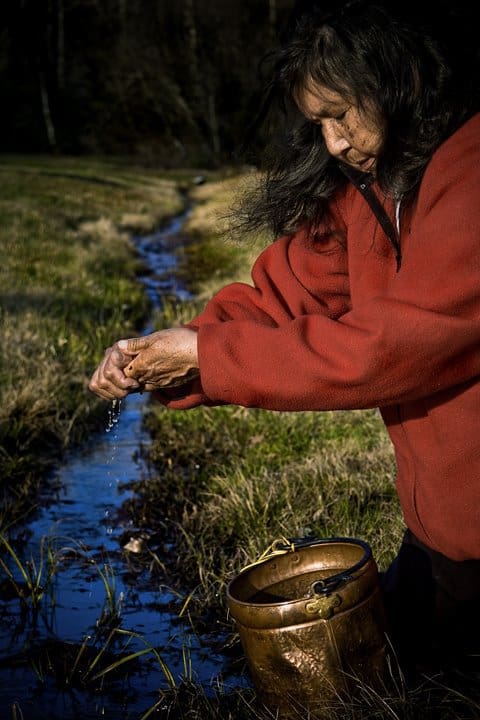The Water Docs International Film Festival runs until Sunday, March 24 at the AGO’s Jackman Hall, and Grandmother Josephine Mandamin, who at 69 walked 16000 kms around the Great Lakes meditating on water and raising awareness about our world water crisis, will be giving a blessing at the festival. Her journey is very expressive. I can barely walk up the stairs at the subway without getting winded, and I’m rarely thinking about anything other than myself and croissants. We had a chance to ask her a few questions about her experiences and thoughts on the current water crisis.
When and how did you first become aware of our world water crisis?
In the year 2000, we heard about a prophecy from one of our elders: By the year 2030, the water crisis will be so bad that water will cost asmuch as gold if we continue with our negligence. He also asked us, “What are you going to do about it?” It motivated me to do something about the water crisis that is happening.
You walked 16000 km around the Great Lakes, what kind of discoveries did you have on your journey?
Each of the lakes had a different meaning, for instance, Lake Superior is a very majestic and powerful lake, but can also be gentle and kind. Lake Michigan had many messages our ancestors had left through rocks, paintings, the artwork they left behind, it was the legacy they left behind for us. In a way, our Water Walk is also a legacy for future generations. When we got to Lake Huron some young men from the community joined us (women from the community also walked with me along different stretches) and continued from then on the journey, which was special.
Did anything unexpected happen?
Not entirely unexpected, but Lake Ontario is a lake that is very polluted in terms of nuclear plants, especially Toronto and New York. The waterwas shimmering with radioactivity. We did not touch the water at all there, we noticed the fish were dead and how heavy the water was. Interestingly, a year later a friend send me a article where scientists were calling it heavy water because of all the radioactive pollution. Lake Erie was very shallow and dirty, all along all we saw was brown water, no clearness during all the time that we walked.
You spent much of the time meditating on the water crisis, what effect did this have on you spiritually or mentally?
I don’t think you need to spend much time reflecting to realize how important this is. I know we are used to a fast-paced way of life, but water is so important for all life to continue on earth (from us, to other animals, to plants). It’s just a fact of life. Again, I know we rarely stop and think, but hopefully people wouldn’t need to do this to know how important water is.
If you could offer any advice to our readers regarding the water crisis, what would it be?”
I think one of the best ways to be aware of the importance of the crisis is to think about it first thing in the morning. When you wake up, think about all the things you are going to do that involve water, brushing your teeth, taking a shower. Sometimes you drink from a cup and leave some water just sitting there, we shouldn’t throw it down the drain, but save it, water your plants with it! I would also like to stress the importance of going out and enjoying nature. Sit outside and enjoy mother nature for a couple of days, realize how important water is, when you are thirsty, how important the first drink of water is. Respect water.
Josephine’s story is but one of the amazing narratives that will be told at the festival. Her advice, to keep water in mind every day, may seem difficult, but if you watch any of the festival’s films on the current state of water in our world you will definitely have something to think about. Some of the screenings will be devastating and others hopeful, but all will help inform and motivate. There are 17 films being screened this year, accompanied by director and guest speaker Q&As. All screenings will take place at Jackman Hall at the AGO. You can buy tickets in advance here. Thank you to Grandmother Josephine for her inspiring words.



 Follow Us On Instagram
Follow Us On Instagram
